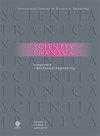PEBA/Na-X Multilayer Hybrid Membrane for CO2 Separation: Influence of Na-X Zeolite Layer Synthesis Condition
IF 1.9
4区 工程技术
Q2 ENGINEERING, MULTIDISCIPLINARY
引用次数: 0
Abstract
The effects of synthesis time and the number of synthesis layers were investigated on the synthesis of Na-X zeolite sublayer for fabricating a PEBA/Na-X hybrid membrane. The CO 2 /N 2 separation was considered as the objective function to obtain an effective Na-X sublayer. SEM and AFM studies of the synthesized sublayers reveal that 6 hour synthesis time and one synthesis layer give an Na-X sublayer (ZSL6-1) with sub-micron thickness (< 1µm), and roughness of 13 nm. The N 2 permeation ( 11900 GPU) shows the low mass transfer resistance through the ZSL6-1 sublayer. The ZSL6-1 sublayer in the hybrid structure of the membrane leads to the high stability of the multilayer structure via the anchoring effect of the polymer. Hydroxyl groups, along with positive and negative charges on the surface of the Na-X sublayer, cause to strong bonding of the polymer layer and prevent its delamination. The surface coverage of the sublayer by polymer has increased the mass transfer resistance just for N 2 and increase the perm-selectivity. These properties, along with the high affinity of the Na-X to the adsorption of CO 2 , results in a 56% increase in the perm-selectivity of CO 2 /N 2 ( ~ 70 ) compared to net PEBA ( ~ 40-50 ) and the recently reported hybrid membranes.用于CO2分离的PEBA/Na-X多层杂化膜:Na-X沸石层合成条件的影响
研究了合成时间和合成层数对制备PEBA/Na-X杂化膜的Na-X沸石亚层的影响。以CO 2 / n2分离为目标函数,获得有效的Na-X子层。对合成亚层的SEM和AFM研究表明,6小时的合成时间和1层合成得到了亚微米厚度(< 1µm),粗糙度为13 nm的Na-X亚层(ZSL6-1)。通过ZSL6-1子层的n2渗透率(11900 GPU)表现出较低的传质阻力。膜的杂化结构中的ZSL6-1亚层通过聚合物的锚定效应导致了多层结构的高稳定性。羟基与Na-X亚层表面的正电荷和负电荷一起,使聚合物层结合牢固,防止其分层。聚合物对亚层的表面覆盖增加了氮气的传质阻力,提高了电极的选择性。与净PEBA(~ 40-50)和最近报道的杂化膜相比,这些特性加上Na-X对CO 2的高亲和力,使CO 2 / n2的热选择性(~ 70)提高了56%。
本文章由计算机程序翻译,如有差异,请以英文原文为准。
求助全文
约1分钟内获得全文
求助全文
来源期刊

Scientia Iranica
工程技术-工程:综合
CiteScore
2.90
自引率
7.10%
发文量
59
审稿时长
2 months
期刊介绍:
The objectives of Scientia Iranica are two-fold. The first is to provide a forum for the presentation of original works by scientists and engineers from around the world. The second is to open an effective channel to enhance the level of communication between scientists and engineers and the exchange of state-of-the-art research and ideas.
The scope of the journal is broad and multidisciplinary in technical sciences and engineering. It encompasses theoretical and experimental research. Specific areas include but not limited to chemistry, chemical engineering, civil engineering, control and computer engineering, electrical engineering, material, manufacturing and industrial management, mathematics, mechanical engineering, nuclear engineering, petroleum engineering, physics, nanotechnology.
 求助内容:
求助内容: 应助结果提醒方式:
应助结果提醒方式:


